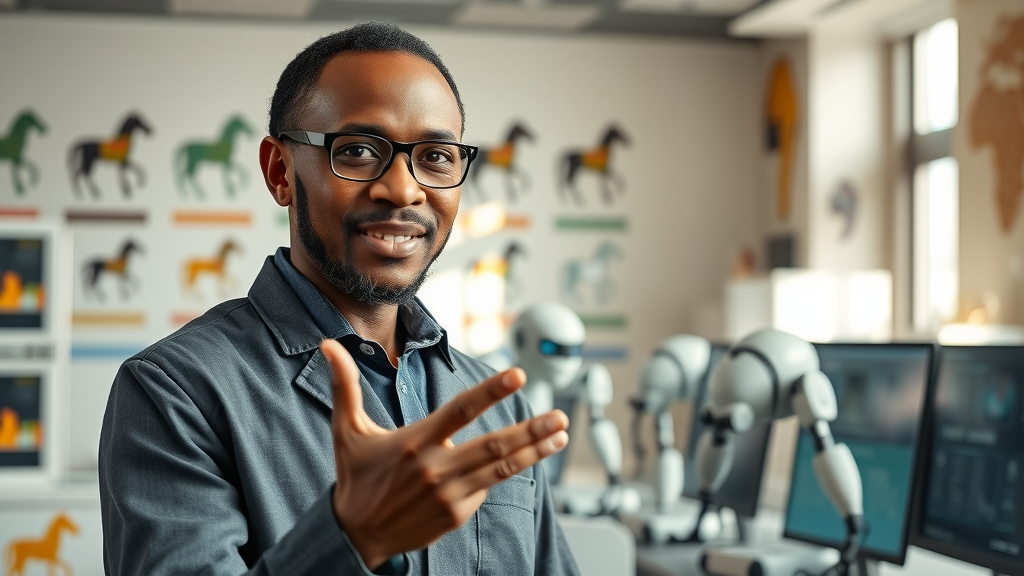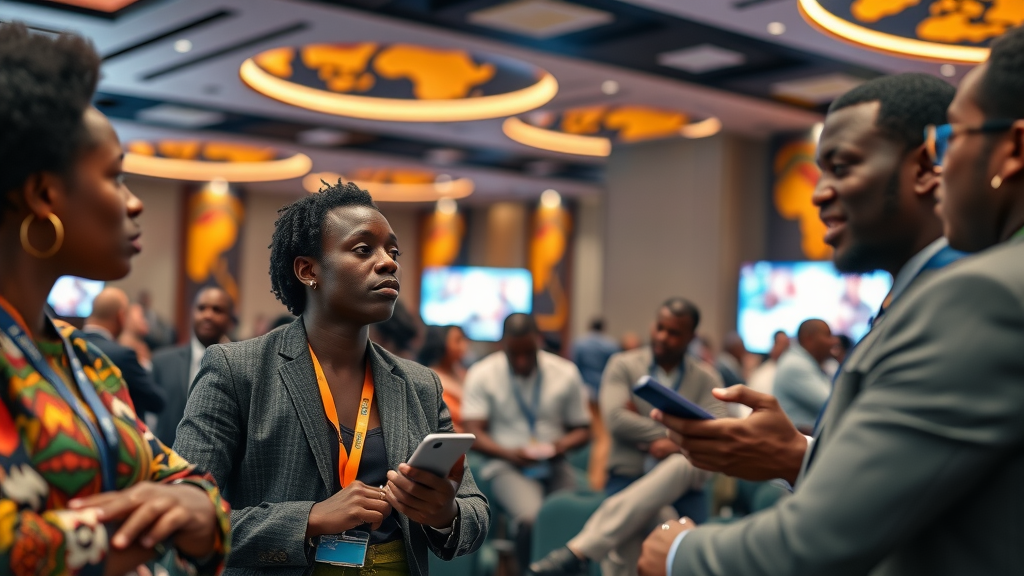Imagine a continent where the pulse of innovation beats so strongly that research outputs have more than doubled in just three years. AI research Africa is not only defying outdated stereotypes about technology in Africa ; it's forging a new narrative—one driven by breakthroughs in health, agriculture, and beyond. In this editorial, you’ll learn how African researchers are shaping a technological renaissance across diverse landscapes while the world takes notice, and how transformative AI solutions are empowering societies from Cape Town to Cairo.
Why AI Research Africa is Redefining the Continent’s Future: A Statistical Reality Check
-
AI research outputs from Africa grew by over 120% in the last three years.
-
AI research Africa is propelled by visionary thinkers, surging investment, and a relentless focus on African innovation. Modern African research is moving beyond stereotypes —from being a tech consumer to being a global creator—unleashing economic opportunity and driving social change at scale.
This seismic shift is not just about numbers; it’s a signal that African AI is rewriting the rules . By harnessing deep learning, generative AI, and indigenous knowledge, African research initiatives are putting the continent on the map as a global research and application powerhouse.
From addressing local challenges to creating world-class AI tools for climate change prediction, disease tracking, and smart agriculture, the narrative is no longer about catching up. Instead, countries like South Africa, Nigeria, and Kenya are setting the standard for how AI in Africa can drive inclusive, sustainable development.

The Evolution of African Research in AI: From the Margins to the Mainstream
Historical Overview of AI Research Africa and Its Indigenous Roots
-
Over the last decade, enrollment in AI and data science fields in African universities has surged, leading to a sharp increase in research publications. This rise is driven by expanding access to digital learning , strategic partnerships, and tailored training initiatives supporting capacity building across the continent.
-
African researchers are not just beneficiaries of global technology, but active innovators in artificial intelligence.
-
Rooted in indigenous problem-solving, AI research Africa adapts technology to solve challenges unique to the continent, from natural resource management to local healthcare practices.
A decade ago, African research in AI was merely a footnote in global discourse. Today, it is an engine for change, as more African researchers publish in leading journals and present at major conferences. The Africa Consortium is now a force in data science and the development of AI research, fostering an enriched Pan-African AI community.
The journey from marginalization to mainstream involvement has seen a shift: now, African AI research delivers valuable contributions to global discussions on AI ethics, local governance, and the adaptation of AI systems for diverse linguistic and societal contexts. The progressive growth of AI in Africa testifies to the continent's innovative spirit.
Milestones: Landmark Achievements in African AI
-
Institutions like the African Institute for Mathematical Sciences and Google AI Accra have won international recognition for groundbreaking research, including natural language models for African languages and advanced disease prediction algorithms.
-
Key projects—such as the African Language Model and AI-powered diagnosis tools—have catapulted Africa into the spotlight for transformative potential in AI research and development.
-
These accomplishments demonstrate that AI research Africa is not limited to replication —it is a springboard for original innovation, now regularly securing funding from African and international tech giants alike.
The collaborative work of African research labs—often in partnership with international organizations—has driven development of AI tools uniquely adapted to the African context. Advances like the use of machine learning for crop yield optimization or fintech applications exemplify the continent’s rapid progress in both research and application.

How Data Science and AI Research Africa Are Advancing Local Solutions
Integrating Data Science with Indigenous Knowledge Systems
-
Today, data science merges seamlessly with African traditions, enabling AI solutions tailored to complex, nuanced local realities . From climate modeling informed by community-shared historical weather patterns to language processing attuned to oral storytelling, African research is building AI that feels homegrown.
-
With cross-border collaboration, researchers design AI and AI-powered data science models that incorporate local dialects, cultural practices, and context-driven priorities.
Traditional African knowledge meets state-of-the-art data science in unexpected ways. Thanks to collaborative research initiatives, indigenous knowledge is digitized and modeled, powering AI applications in resource management, disease control, and disaster prediction . This fusion ensures not only the relevance but the accuracy and sustainability of AI solutions for African societies.
Capacity building efforts also support this transformative approach; more African researchers receive mentorship, access to cutting-edge AI tools, and participate in international exchanges. This groundswell is redefining what AI in Africa means—for research, business, and community life.
Case Studies: African Solutions in Health, Agriculture, and Finance
-
From AI-powered malaria prediction in Ghana to deep learning crop monitoring systems in Ethiopia and next-gen fintech in Nigeria, African-led research is unleashing AI applications that directly impact local and global markets .
-
AI-driven systems support public health by tracking epidemics in real time, optimize distribution in smart agriculture, and expand access to banking services via mobile-based AI solutions—all shaped by the African context.
For example, machine learning models help accurately predict malaria outbreaks , saving lives in areas previously underserved by healthcare systems. In agriculture—where food security is a core concern—AI tools estimate crop yields and guide farmers on planting schedules to boost resilience. The rise of Africa-specific fintech platforms, meanwhile, testifies to the continent’s growing leadership in harnessing AI for financial inclusion.
|
|
|
|
Notable AI-Driven Data Science Projects in African Research |
|
Project |
Application |
Impact |
Technology Used |
|---|---|---|---|
|
Malaria Early Warning System (Ghana) |
Health |
Predicts outbreaks, improves prevention |
Machine Learning, Data Science |
|
Farmerline |
Agriculture |
Optimizes yields, supports smallholders |
AI Algorithms, Mobile Tech |
|
Flutterwave |
Finance |
Expands digital payments and inclusion |
AI, Payment APIs |
|
Masakhane Project |
Language Technology |
Advances African language translation |
Natural Language Processing |
AI in Africa’s Diverse Landscapes: Languages, Societies, and the Digital Divide
Empowering African Languages through Artificial Intelligence
-
AI research Africa is at the forefront of developing advanced language models and translation tools for Africa’s more than 2,000 languages and dialects. Initiatives like the Masakhane Project are globally recognized for training AI algorithms using local African languages, empowering digital literacy and cultural preservation.
-
Natural language processing research enables broader internet accessibility and digital content creation in African languages, reducing inequalities in information access across rural and urban areas.

By anchoring artificial intelligence in local language use, African researchers are carving a path toward equitable AI systems that truly represent the continent’s diversity. The future of artificial intelligence in Africa must embrace linguistic diversity to be truly inclusive. These language-focused AI solutions not only serve the African context but are now referenced as models in global AI transformation.
Tackling Societal Challenges Through AI Research Africa
-
AI research Africa confronts education access, misinformation, and service delivery through innovative, context-sensitive solutions. For instance, AI-powered virtual classrooms now make quality education accessible to children in remote regions, while machine learning models combat misinformation during health emergencies.
-
Societal needs—such as rapid urbanization, linguistic diversity, and a youthful population—drive African AI researchers to invent systems that bridge divides between people and technology, ensuring solutions fit the realities on the ground.
The unique demands of African societies inspire AI solutions that put people first. Whether through mobile-based platforms for farmers, e-health services for patients, or real-time translation tools for multilingual communities, AI Africa is increasingly embedded in everyday life.
As digital literacy rises, AI is key to delivering services efficiently and safely, making sure that no group is left behind. Localized AI applications address infrastructural challenges and help governments and organizations connect with even the most remote or vulnerable communities.
Closing the Digital and AI Skills Gap
-
African research programs, coding bootcamps, and e-learning platforms are accelerating AI upskilling and digital literacy . Targeted initiatives focus on empowering young Africans, especially women and underrepresented groups, to become leaders in the next generation of AI researchers and engineers.
-
Capacity building efforts are strongly supported by governments, international partners, and the African tech diaspora, nurturing a dynamic AI community across the continent.

The digital and AI skills gap is shrinking as African research institutions prioritize hands-on, context-aware training. Coding bootcamps and tech hubs across South Africa, Kenya, Nigeria, and Ghana are equipping the workforce with essential AI and data science skills for tomorrow’s jobs.
These collaborative education efforts are further strengthened by industry partnerships and government support, ensuring that digital transformation is broad-based and sustainable. As more young Africans enter the AI workforce, the continent’s role as a global innovator only continues to grow.
Global Impact: How African AI Solutions Inspire Worldwide Change
Exporting African Solutions: The Global Reach of AI Research Africa
-
African research in artificial intelligence now commands international respect. AI tools and data science systems pioneered in Africa have been adopted in Asia, South America, and even developed markets to solve parallel challenges—whether it’s disaster prediction in Bangladesh or mobile fintech in Brazil.
-
Projects such as the pan-African Deep Learning Indaba have helped export African AI frameworks, while startups like Flutterwave are cited globally as breakthrough fintech innovators.
The global reach is a testament to the growing stature of AI research Africa . Solutions like the African language model and digital health platforms now serve international needs, highlighting the transformative potential and adaptability of African AI.
As AI Africa's influence expands, international organizations routinely seek out African partners to design tools for everything from climate change analytics to inclusive digital platforms. These exchanges are reshaping the global technology landscape and setting new standards for equity and ingenuity.
Collaboration with International Partners in Artificial Intelligence
-
Major collaborations with global companies—including Google, IBM, and Microsoft—and partnerships with European and Asian research labs have positioned African research institutions at the heart of worldwide AI advancement.
-
Top African researchers and AI innovators routinely present at global AI forums, introducing new AI methodologies that prioritize inclusiveness and context-driven problem-solving.
-
Africa’s AI breakthroughs are contributing to a more equitable global technology landscape.
-
Top African AI Trailblazers:
-
Moustapha Cissé (Senegal): Led Google AI Accra, advancing deep learning and ethical AI.
-
Vukosi Marivate (South Africa): Drives AI for public good.
-
Timnit Gebru (Ethiopia): Global leader in ethical and inclusive AI.
-

Cross-continental partnerships are no longer the exception—they are the norm for African AI. By fostering mutual learning and advocating for responsible AI, African researchers now help shape the international AI research agenda, driving global progress toward a fairer digital future.
African AI trailblazers—supported by thriving local ecosystems and a passionate AI community—are among the world’s most sought-after voices on deep learning, AI ethics, and sustainable technological development.
Challenges and Opportunities for AI Research Africa: Policy, Ethics, and Sustainability
The Ethical Landscape: Bias, Privacy, and Local Governance
-
Ongoing debates in AI research Africa address algorithmic bias, data privacy, and the need for trust in AI systems. Given the rich diversity of African languages and societies, ensuring inclusive models is an ongoing challenge—and priority—for AI researchers.
-
Building robust AI governance frameworks rooted in local realities is essential to secure public trust and guide responsible AI deployment.
African researchers are at the forefront of ethical AI development. Recent research initiatives emphasize transparency, community engagement, and protection of user data, seeking to prevent the exclusion or misrepresentation of minority groups in AI systems.
Cross-border ethics committees, supported by institutions like the African Union, are working to harmonize best practices and standards, ensuring AI tools are trustworthy and context-appropriate.
Policy Frameworks: African Countries Leading in AI Strategies
-
Several African countries have developed comprehensive AI strategies and policy frameworks , with a focus on research funding, talent development, ethical guidelines, and alignment with national development goals.
-
South Africa, Ghana, Rwanda, Tunisia, and Egypt are recognized leaders, each tailoring their policy priorities to local strengths and global trends in AI innovation.
|
|
|
AI Policy Strategies of Leading African Countries |
|
Country |
AI Strategy/Policy |
Research Priorities |
|---|---|---|
|
South Africa |
National AI Policy Framework |
Education, Healthcare, Smart Cities |
|
Ghana |
Digital Ghana Agenda |
Fintech, Agriculture, Local Languages |
|
Rwanda |
AI & Robotics Research Center |
Public Services, Drones, Governance |
|
Tunisia |
AI National Strategy |
EdTech, E-Health, Data Science |
|
Egypt |
AI Council for Policy Guidance |
Manufacturing, Infrastructure, Language Tech |
Building a Sustainable AI Ecosystem in Africa
-
Future growth depends on strategic funding, academic innovation, and harnessing the African tech diaspora. Grants from the African Union, World Bank, and private investors are fueling the creation of AI hubs and research centers.
-
Academic institutions and local businesses are building strong AI communities, mentoring talent, and promoting collaborations across borders to accelerate the impact of African research in artificial intelligence.

A truly sustainable ecosystem recognizes the cyclical exchange between research, industry, and policy, backed by proactive involvement of the diaspora. This approach is shaping the next generation of AI in Africa—bolder, greener, and more attuned to societal needs.
By investing in foundational infrastructure—such as research institutes, AI tools, community networks, and green tech—African countries are strengthening their leadership in the development of AI research.
Video: African Research and the Future of Artificial Intelligence: Insights from Leaders
-
In this video segment, you’ll hear directly from Africa’s most prominent AI innovators on what’s next for the continent’s research agenda, including their visions for AI-driven growth, digital inclusion, and global partnerships.
Lists: 10 Game-Changing African AI Solutions Transforming Markets
-
1. Malaria Early Warning System (Health)
-
2. Farmerline (Agriculture)
-
3. Flutterwave (Finance)
-
4. Masakhane Project (Language Technology)
-
5. Ubenwa (Health: Infant Cry Analysis)
-
6. M-Shule (EdTech)
-
7. SunCulture (Agriculture: Solar Irrigation)
-
8. Aerobotics (Precision Farming)
-
9. mPedigree (Supply Chain)
-
10. KilimoSalama (Climate-Smart Agriculture)
Video: AI in Africa - Real Stories of Innovation
-
This mini-documentary features testimonials from African entrepreneurs and research teams who are redefining AI applications across healthcare, education, and commerce.
People Also Ask: Which country is leading in AI research?
-
South Africa, Nigeria, and Kenya are currently leaders in AI research Africa, with strong investments in AI hubs, research funding, and university collaborations. South Africa leads in academic publications, while Nigeria has a burgeoning ecosystem of AI startups and research labs.
People Also Ask: How is AI being used in Africa?
-
AI research Africa is applied in predictive healthcare, smart agriculture, language technologies, disaster response, fintech innovation, and education access. AI solutions are developed to meet local needs and leverage indigenous knowledge systems.
People Also Ask: Which African countries have AI strategies?
-
Countries like Rwanda, Ethiopia, Egypt, Ghana, and Tunisia have established or are implementing national AI strategies, focusing support on local innovation, research funding, and ethical AI development tailored to African realities.
People Also Ask: Who is the most famous AI researcher?
-
Moustapha Cissé from Senegal, former lead of Google AI Accra, is regarded as a key figure in AI research Africa. Other notable names include Vukosi Marivate (South Africa) and Timnit Gebru (Ethiopia).
Lists: Key Ingredients for Sustainable African AI Development
-
Government investment in AI research infrastructure and grant funding
-
Business commitment to responsible AI solution deployment
-
Talent development—with a focus on women and underrepresented groups
-
Robust policy frameworks supporting ethical and local digital innovation
-
University-led capacity building and interdisciplinary research initiatives
-
Community engagement for equitable AI adoption
-
Partnerships with African diaspora and international research networks
FAQs on AI Research Africa
-
What is the current state of AI research Africa? The continent is experiencing sustained growth, marked by an explosion of research output, top-tier academic programs, and the rise of pan-African AI collaborations. With a swelling pool of AI researchers and innovators, AI research Africa is fast becoming a global leader in contextually driven AI solutions.
-
Which sectors benefit most from AI research Africa? Healthcare, agriculture, financial technology, education, and supply chain logistics are among the sectors experiencing rapid transformation. African AI solutions address local and regional challenges, unlocking efficiency and improving service delivery.
-
Are there challenges in developing African languages for AI? Yes, challenges include limited digital data for many African languages and the need for context-aware models. However, driven by community collaboration, projects like Masakhane are overcoming barriers and setting new global standards for inclusivity in AI.
-
What organizations are funding AI research Africa? Funding comes from diverse sources, including the African Union, World Bank, Google, Microsoft, Facebook AI Research, and the Bill & Melinda Gates Foundation. Homegrown African tech companies and government grants are also accelerating research and development.
-
How can young Africans get involved in AI research Africa? Through university programs, local innovation hubs, online coding bootcamps, hackathons, and mentorship networks, young Africans are entering the AI workforce and driving local and global transformation.
Video: The Next Frontier — African AI and Data Science Revolution
-
Watch an expert panel discussion on the evolving opportunities and challenges facing Africa’s data science and AI ecosystem, including policy shifts, global collaboration, and groundbreaking innovation.
Key Takeaways: Lessons from Africa’s AI Research Renaissance
-
Africa’s rise in AI research is powered by community spirit, cultural adaptability, and visionary leadership .
-
The continent’s focus on solving local challenges is fueling global AI innovation—and reshaping narratives worldwide.
What Readers Will Gain by Understanding AI Research Africa’s Transformative Journey
-
By exploring this journey, readers gain insights into how African leadership and innovation in AI research create meaningful, lasting impact—transforming not just markets, but lives and communities across the continent and beyond.
Final Thoughts on AI Research Africa: Embracing Opportunity and Driving Inclusive Progress
-
The sustained impact of AI research Africa depends on pan-African collaboration and greater global awareness. Join the movement—support, invest, and participate in Africa’s AI-powered future to drive progress that includes everyone.
-
The time to invest in Africa’s technological renaissance is now. Your engagement helps unlock the transformative potential of AI solutions for generations to come.
African AI research is experiencing a transformative era, marked by significant advancements and the establishment of dedicated institutions. The African Institute for Mathematical Sciences (AIMS) has been pivotal in this progress, offering Master’s and PhD programs in AI, machine learning, mathematics, and data science across its centers in Cameroon, Ghana, Senegal, South Africa, and Rwanda. Since its inception in 2003, AIMS has graduated over 3,000 students, contributing substantially to the continent’s AI talent pool. ( brookings.edu )
In 2024, the Machine Intelligence and Neural Discovery (MIND) Institute was launched at Wits University in South Africa. This innovative research hub focuses on advancing fundamental AI research and understanding intelligence across machines, humans, and animals. The MIND Institute collaborates with industry leaders, including IBM, to develop cutting-edge technologies tailored to Africa’s unique challenges. ( wits.ac.za )
These institutions exemplify Africa’s commitment to fostering a robust AI ecosystem, driving innovation, and addressing local and global challenges through artificial intelligence.
 Add Row
Add Row  Add
Add 




 Add Row
Add Row  Add
Add 

Write A Comment